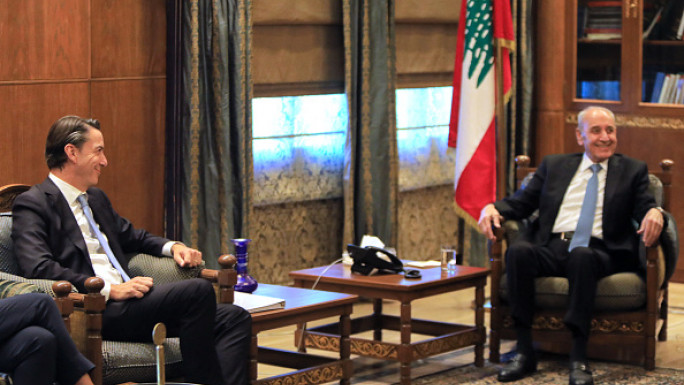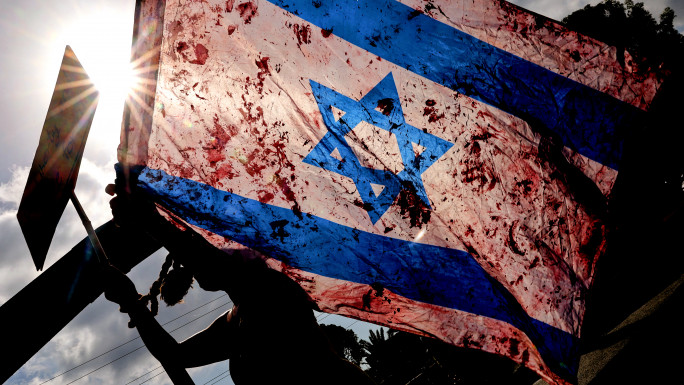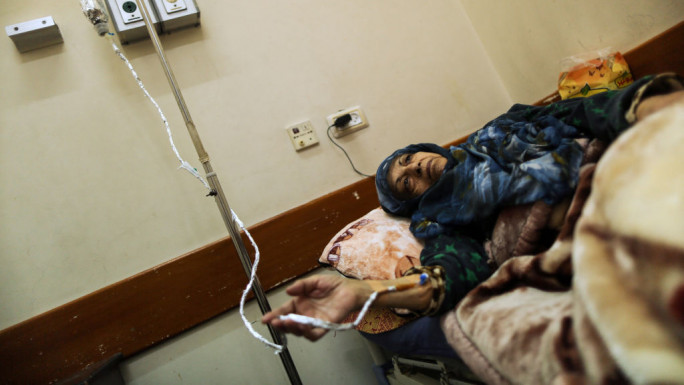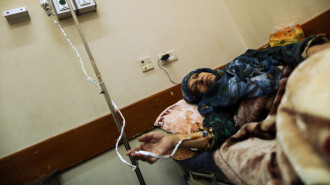
Winter among war: The freezing struggle of Gaza's displaced

The Gaza Strip has unquestionably seen more than enough carnage within the last 40 days, as Israel continues its aggression while restricting access to every basic need.
The number of Palestinians killed has risen to more than 11,000 including 4,506 children and 3,027 women, the Palestinian Health Ministry in Gaza said on Friday, and almost 1.6 million people have been internally displaced since October 7 — more than half of Gaza's population.
"I can barely find water to drink for my family right now even after spending the whole morning in a queue. This has become a daily challenge"
The fighting is prompting increasing numbers of civilians to flee south, and growing numbers of people have been living in and around hospitals, hoping it will be safer than their homes or United Nations shelters in the north, several of which have been hit repeatedly.
Water is harshly limited, gas has been sold out at all stations, food is either expired or impossible to get, and there has been no electricity since the early hours of October 13.
But this already dire situation is expected to become even worse as winter draws closer.
"I am starting to feel very panicked because I do not have any winter clothes for me or any of my family," said Hussain Al-Ramlawi, a father of four young children. "We are really suffering, especially my small baby. I am absolutely disheartened and feel helpless."
|
Winter temperatures in Gaza can drop to about 9-10°C, according to NOAA (National Centers for Environmental Information), and these temperatures sometimes fall further low during low-pressure fronts.
A winter's day in the Gaza Strip will see approximately 2-3 hours of sun — some days even less than that. This will pose further problems for the water stations that use solar panels for energy. Given the fact that solar panels need at least 5 hours of good sun to operate all day, winter will shrink the efforts of these stations and add more difficulty to these people getting water.
"I can barely find water to drink for my family right now even after spending the whole morning in a queue. This has become a daily challenge,” said Adel Abu Hussanien, a water truck driver and a father of four from Deir al-Balah.
"I also receive more than 100 calls every day from people asking for water. I am truly bewildered about whom I should respond to."
According to a stat by the Norwegian Refugee Council (NRC) in February 2023, more than 120,000 Palestinians in Gaza were living in 21,500 homes that had no windows, safe roofs or doors, leaving families to face winter conditions in unprotected shelters.
This war on Gaza has caused a sudden increase in these numbers. Al-Jazeera in its latest update to the situation in the Gaza Strip confirms that more than half of Gaza’s housing units — around 40,000 — were completely destroyed by Israeli bombardments.
People in Gaza are currently facing a severe humanitarian crisis. With most people resettling in schools, tents, or hospitals, these areas are now becoming too overcrowded and failing to meet people’s basic needs.
The majority who have now been forced to leave their homes had to do so without being able to take important essentials for the cold weather with them while on the move. This means that many people will face a very difficult winter without warm clothes, jackets, blankets, or even mattresses to sleep on.
“I have only come with the clothes I am currently wearing, I have nothing prepared for the winter. I have no idea how I will protect myself from the long cold hours of the night," said Om Mahmoud Abu-Khdair.
Hussain further tells The New Arab, "Despite resettling at my uncle's house, the number of blankets and mattresses are not enough."
Sahar, Hussain's sister, also feels frightened for her toddler. “I have some clothes for my infant, but unfortunately, nothing for winter. His father tried to buy him some winter clothes, but he did not find any. I am terrified.”
Sahar, Hussain, and Om Mahmoud Abu-Khdair are among the thousands who will suffer this winter.
The cold weather will also be disruptive to hospitals, which predominantly rely on solar power to run their systems and machines.
|
Doctor Khalid Abu-Habel brings up the importance of being protected during the winter, telling The New Arab, "We have many diseases, such as flu, cold, and fever, going around at the moment. It is, of course, a result of the lack of protection during the cold evenings and mornings.
“We are in fact afraid that there will be an unprecedented wave of flu and winter diseases unless these people are well-protected during winter,” Doctor Khalid added.
As winter approaches, many people will face an additional plight. Children, the elderly and pregnant women, in particular, will have to bear unbearable conditions.
Winter, known to be the best friend of many people in Gaza, will turn out to be a deadly enemy in a few days and will contribute to more deaths and diseases unless people are helped accordingly.
Abubaker Abed is a Palestinian journalist, writer, and translator from the Deir al-Balah Refugee Camp in Gaza
Follow him on X: @AbubakerAbedW




 Follow the Middle East's top stories in English at The New Arab on Google News
Follow the Middle East's top stories in English at The New Arab on Google News


